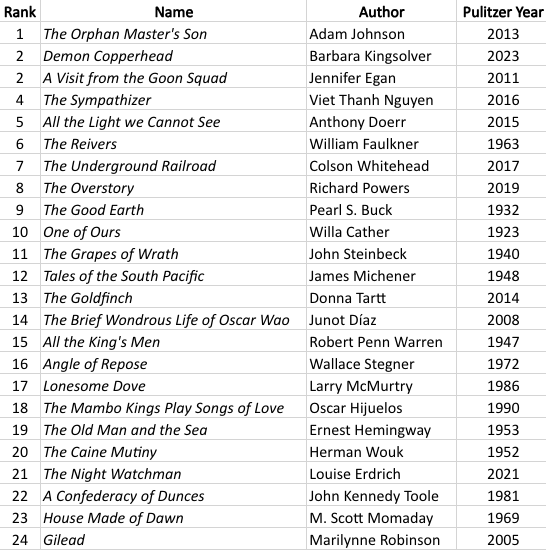
I just finished Colson Whitehead’s The Underground Railroad. It’s an excellent book that read so quickly I was able to finish it on time (that is, before midnight on December 31st). Whitehead’s style really carries the story quickly. It has me thinking I’ll read his other Pulitzer, The Nickel Boys , one of these days soon.
But I have other things in mind for now, first of which will probalby be a leisurely stroll through The Lord of the Rings. It’s been a while.
As I’ve mentioned before, it was a bit over a year ago — probably around the time I was reading The Goldfinch — that I realized I was on my third straight Pulitzer, so I decided to keep that string going through the end of 2023 (this was in November of 2022). Thus, every bit of my reading for leisure over the past year has been a Pulitzer prize winner for fiction (or, the novel, as it was called until the late ’40s). And again, I really recommend anyone take on an approach to reading like this. It gives you variety and (for the most part) quality in your reading. While exposing you to authors you may not have considered otherwise.
So here’s the final tally. Every one of them was quite good, although when I got down to Gilead, I was rather unimpressed. I would call that a product of the “Oprah Effect,” as it was one of her book-club offerings. Decent, but a bit of a drag. I don’t think I have much bad to say about any of the books above it (although Wallace Stegner’s Angle of Repose did seem to drag a bit — but was such a good story, it still made its way up the list). And then, of course, there was the one book that I thought was a piece of trash (and have decided I won’t even give the ink to say how bad I thought it was).

I’ll gladly talk to anyone who has any questions or comments. You obviously can’t go wrong with most of these. Here’s a bit of a blurb from all I can remember:
The Orphan Master’s Son — Just all-around excellent, setting a fantastical story against a North Korean backdrop doesn’t make it so fantastical.
Demon Copperhead — David Copperfield of Appalachia. Tragic. “Gripping.
A Visit From the Goon Squad — Amazing writing that takes you all over the story.
The Sympathizer — Deep and thoughtful undercover.
All the Light we Cannot See — Such a good story. Tragedy and lost innocence in occupied France.
The Reivers — Hilarious story about a car and a horse.
The Underground Railroad — Such a good telling of a tragic story, with an ending that does lead one to hope.
The Overstory — So interesting. The intertwining of lives around incredible stories of trees. Or is that “stories of incredible trees”?
The Good Earth — A classic that traces the life of a Chinese farmer.
One of Ours — A beautiful telling of the tragedy of World War I. My earliest Pulitzer (1923).
The Grapes of Wrath — Before I started this project, this was my favorite Pulitzer. It’s still an incredible story from an incredible time in American history, but perhaps this dropping all the way to 11 shows how cool it is to expand one’s reading by doing something like this.
Tales of the South Pacific — Michener writing an incredible story of…yeah, the South Pacific during World War II. Better than the movie.
The Goldfinch — A life spiraling tragically around the account of a painting “lost” in a terrorist bombing.
The Brief Wondrous Life of Oscar Wao — Another tragic life of someone who didn’t fit in. I remember little about this book, but it read well while I was reading it.
All the King’s Men — A political story modeled after the life of Louisiana politician Huey Long.
Angle of Repose — A fascinating story based on the letters of a real-life woman whose marriage…wasn’t the best for her potential.
Lonesome Dove — As cowboy stories go, this is the best.
The Mambo Kings Play Songs of Love — An interesting story of Cuban immigrants. A bit too heavy on the sex for me in spots.
The Old Man and the Sea — A man’s struggle with a great fish, etc. A good short story.
The Caine Mutiny — I couldn’t help but picture Bogart throughout the book. A good World War II Navy story.
The Night Watchman — Based in part on he real-life heroic efforts of the author’s grandfather to defend Native American rights in 1950s Utah.
A Confederacy of Dunces — Pulitzer awarded posthumously for this story of an outrageous man who saw the world outrageously differently.
House Made of Dawn — Another that was not entirely memorable, dealing again with the lives of native Americans.
Gilead — A long letter from a preacher to his son.
